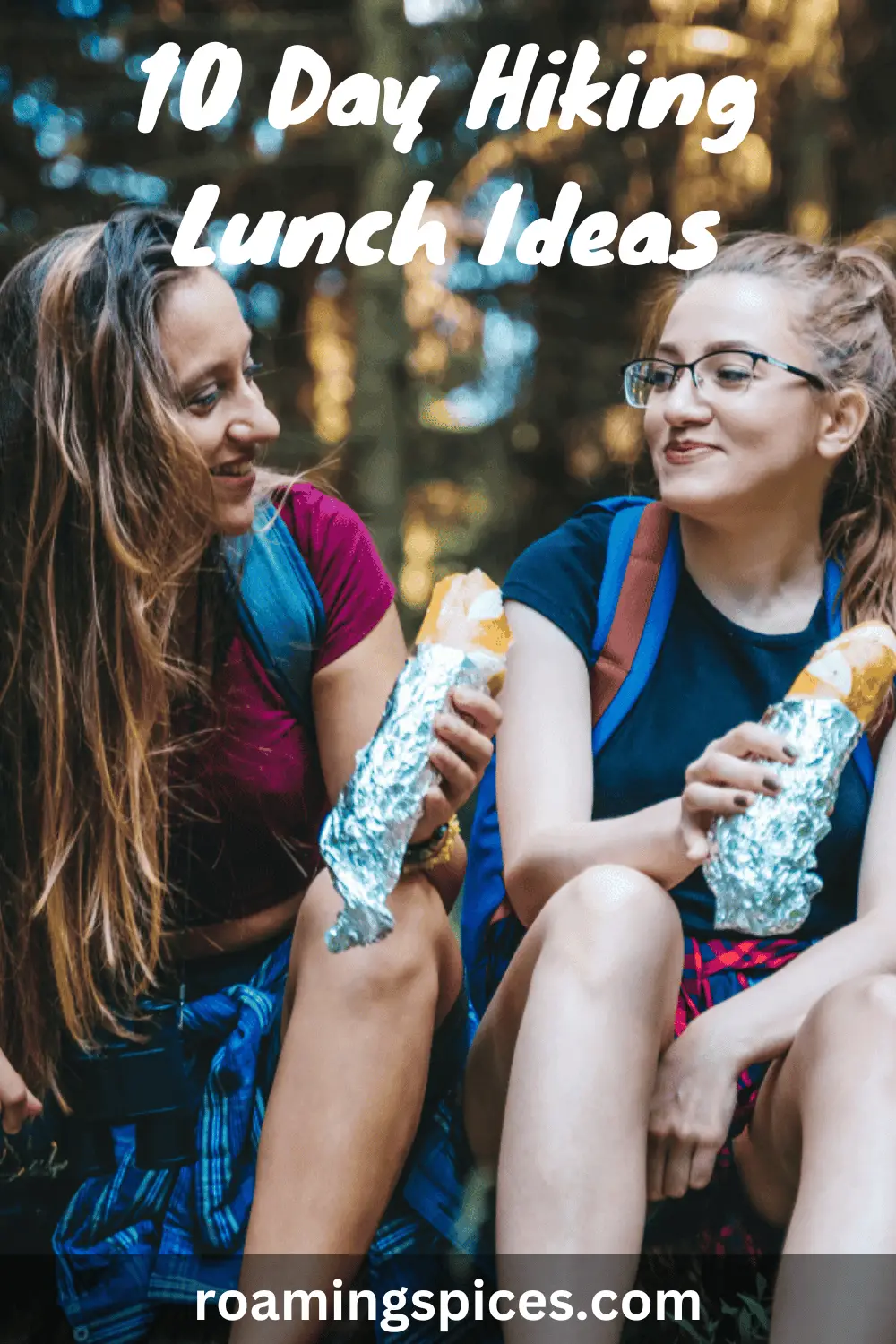
Hiking Nutrition
Do you want to avoid bland and uninspiring lunches on your day hikes? Look no further! This article presents a plethora of creative and delicious day hiking lunch ideas that will excite your taste buds and fuel your adventures
Importance of fuelling your body for day hikes
Fuelling your body is crucial for any physical activity, and day hikes are no exception. Whether embarking on a leisurely hike or tackling a challenging trail, providing your body with the correct fuel is essential to enhance your performance, maintain your energy levels, and ensure an enjoyable hiking experience.
This article focuses on some fantastic day hiking lunch ideas to energise you on the trail. First, we discuss how the correct food intake can prepare you for your hiking adventure.
Energy Levels and Endurance
Hiking can be physically demanding, requiring significant amounts of energy and endurance. Fuelling your body with the proper nutrients before and during a hike helps maintain optimal energy levels, enabling you to hike for longer without fatigue.
Carbohydrates, such as whole grains, fruits, and energy-rich snacks, provide the necessary energy to power your muscles and sustain your activity levels throughout the hike.
Hydration and Electrolyte Balance
Staying hydrated is paramount during physical activity, and hiking is no different. Proper hydration ensures your body functions optimally, aids in regulating body temperature, and helps prevent fatigue.
Dehydration can decrease performance, cause muscle cramps, and even more severe health risks. Along with water, replenishing electrolytes through sports drinks or electrolyte-rich snacks is vital to maintain a healthy electrolyte balance.
Muscle Recovery and Repair
Hiking often involves uphill climbs, uneven terrain, and repetitive movements, which can strain your muscles. Consuming the proper nutrients post-hike plays a crucial role in muscle recovery and repair.
Protein-rich foods like lean meats, nuts, and legumes help repair damaged muscle tissues, reduce soreness, and promote faster healing. Additionally, consuming antioxidants from fruits and vegetables aids in reducing inflammation and supporting overall muscle health.
Mental Focus and Concentration
Hiking demands physical endurance, mental focus, and concentration, especially when navigating challenging terrain or making important decisions on the trail. Proper nutrition ensures that your brain receives the necessary nutrients to function optimally.
Foods rich in omega-3 fatty acids, such as walnuts, flaxseeds, and salmon, support brain health and enhance cognitive function, improving your focus and decision-making abilities during the hike.
Immune System Support
Spending time outdoors exposes you to various environmental elements, including germs and bacteria. A well-nourished body with a robust immune system is better equipped to defend against illnesses and infections.
Including immune-boosting foods, such as citrus fruits, leafy greens, and yoghurt, in your pre-hike meals strengthens your immune system and reduces the risk of falling ill during or after the hike.
Factors to Consider for Day Hiking Lunch Ideas
When choosing hiking lunches, there are several factors you should consider to ensure you have nourishing and convenient meals during your outdoor adventures. Here are some factors to keep in mind:
Nutritional Value: Select foods that balance macronutrients (carbohydrates, protein, and fat) and essential vitamins and minerals. Hiking can be physically demanding, so you’ll need meals that provide sustained energy and help with muscle recovery.
Calorie Density: Opt for calorie-dense foods that provide a high amount of energy in a compact form. This is important because you’ll need light meals that only take up a little space in your backpack but still provide sufficient calories to sustain your energy levels.
Weight and Portability: Consider the weight and portability of your lunch options. Look for lightweight, non-perishable foods that are easy to carry in your backpack without adding unnecessary weight. Foods that come in resealable or compact packaging are also convenient.
Shelf Life: Choose foods with a longer shelf life, especially if you plan a multi-day hike. Look for items that won’t spoil quickly and withstand various weather conditions. This will ensure your food stays fresh and safe throughout your trip.
Preparation and Convenience: Consider your lunch options’ ease of preparation and convenience. Foods that require minimal cooking or can be eaten straight out of the packaging are ideal. Look for items that don’t require refrigeration or can quickly rehydrate with water.
Dietary Preferences and Restrictions: Consider your dietary preferences and any restrictions you may have, such as vegetarian, vegan, gluten-free, or allergies. Ensure you choose meals that align with your nutritional needs to avoid discomfort or health issues during your hike.
Taste and Enjoyment: While the practical aspects are essential, remember to choose foods you enjoy eating. Hiking can be physically challenging, and having tasty meals can boost morale and provide a much-needed mental break during your adventure.
Environmental Impact: Consider the environmental impact of your food choices. Opt for foods with minimal packaging, choose reusable containers, and avoid single-use items whenever possible.
Additionally, be mindful of waste management during your hike by packing out any trash and disposing of it properly.
By considering these factors, you can choose hiking lunches that provide the necessary sustenance, are easy to carry, and suit your dietary preferences while minimising the environmental impact of your outdoor excursions.
Quick and Easy High-Energy Day Hiking Lunch Ideas
Regarding day hiking, it’s essential to have quick and easy high-energy lunch ideas that will keep you fuelled and satisfied throughout your adventure. Here are ten options to consider:
Trail Mix: A classic hiking snack that combines nuts, dried fruits, and seeds. You can make your mix or buy pre-packaged options.
Peanut Butter and Banana Wrap: Spread peanut butter on a whole wheat tortilla, add sliced bananas, and roll it up. It’s portable and provides a good balance of carbohydrates, healthy fats, and protein.
Hummus and Veggie Sandwich: Use whole grain bread and spread hummus on one side. Add sliced cucumbers, bell peppers, and any other veggies you enjoy. It’s refreshing and provides a good crunch.
Quinoa Salad: Cook quinoa ahead of time and toss it with your favourite vegetables, such as cherry tomatoes, diced cucumbers, and chopped bell peppers. Drizzle with lemon juice and olive oil for a light and refreshing lunch.
Energy Bars: Look for high-quality energy bars packed with nuts, seeds, and dried fruits. They’re convenient and provide a quick source of energy.
Tuna or Chicken Salad Wrap: Mix canned tuna or cooked chicken with Greek yoghurt or avocado for a healthier twist. Add chopped celery, onions, and a squeeze of lemon juice. Wrap it in a whole wheat tortilla or lettuce leaves.
Hard-Boiled Eggs: Hard-boiled eggs are an excellent source of protein and healthy fats. Pack a couple of eggs along with some salt and pepper for a simple and nutritious lunch option.
Nut Butter and Apple Slices: Slice an apple and pair it with your favourite nut butter. It’s a quick and refreshing option that provides a good balance of carbohydrates and healthy fats.
Couscous Salad: Cook couscous ahead of time and mix it with diced tomatoes, cucumbers, olives, and feta cheese. Toss with olive oil and lemon juice for a flavorful and filling salad.
Wraps with Deli Meat and Cheese: Fill whole grain wraps with your preferred deli meat, cheese, and vegetables. Roll them up and pack them for an easy-to-eat lunch on the trail.
Remember to pack these day hiking lunch ideas in a way that keeps them fresh and prevents any spoilage. Also, stay hydrated by carrying enough water or other suitable beverages during your hike.
Buy Hiking Meals on Amazon
Smart Packing Strategies for Hiking Lunches
When packing lunches for hiking, it’s important to consider portability, freshness, and nutritional value. Here are some intelligent packing strategies to help you fit in your day hiking lunch ideas:
Use compact and lightweight containers: Opt for lightweight, durable containers that won’t add extra weight to your backpack. Look for collapsible containers, bento boxes, or stackable containers to maximise space.
Choose non-perishable foods: Since you’ll be outdoors for an extended period, select foods that can withstand the journey without spoiling. Some examples include dried fruits, nuts, energy bars, jerky, and individually packaged snacks.
Pack fresh ingredients separately: If you prefer fresh ingredients like lettuce, tomatoes, or avocado in your sandwiches or salads, pack them separately in small resealable bags or containers. This way, they will only make the bread or other items soggy after you’re ready to eat.
Utilise vacuum-sealed bags: Vacuum-sealed bags are excellent for preserving the freshness of sandwiches or wraps. The vacuum seal helps prevent moisture buildup, keeping the food fresh and maintaining its flavour. Plus, it saves space in your backpack.
Opt for sturdy bread: Choose bread with a firm texture like ciabatta, baguette, or whole-grain bread to prevent it from becoming mushy during the hike. These types of bread are less likely to get crushed or absorb moisture.
Pack condiments separately: Rather than spreading condiments on your sandwiches in advance, carry small, leak-proof containers filled with your favourite sauces, spreads, or dressings. This prevents the bread from becoming soggy and allows you to control your condiments.
Consider dehydrated meals: If you’re going on a multi-day hike, dehydrated meals can be a convenient option. Look for options with a good balance of nutrients to keep you energised. They are lightweight, compact, and easy to prepare with boiling water.
Bring reusable utensils: Pack lightweight, reusable utensils like a spoon, fork, or spork. These are not only eco-friendly but also essential for enjoying your meals comfortably.
Stay hydrated: Alongside your lunch, pack enough water or a water filtration system to stay hydrated throughout your hike. Proper hydration is crucial for maintaining energy levels and overall well-being.
Plan for waste management: As an environmentally conscious hiker, bring a small garbage bag to collect and carry your waste. Leave no trace and help keep the trails clean.
Remember, the key is to pack foods you enjoy and provide sustained energy during your hike. Consider your dietary preferences and specific dietary restrictions to ensure a satisfying and nourishing hiking lunch experience.
Day Hiking Lunch Ideas – Conclusion
In conclusion, incorporating creativity into your day hiking lunches can elevate your outdoor dining experience and provide the sustenance you need to conquer the trails.
By implementing these creative day hiking lunch ideas, you can enjoy delicious, nutritious meals that are easy to pack, portable, and enjoyable. Whether you opt for vibrant salads, innovative wraps, or flavorful sandwiches, the key is prioritising freshness, convenience, and variety.
Experiment with different ingredients, flavours, and textures to keep your taste buds engaged and your energy levels high. Remember to pack plenty of water and consider the environmental impact of your choices by utilising reusable containers and practising responsible waste management.
So, get ready to embark on your next hiking adventure armed with these creative lunch ideas, and savour the satisfaction of a well-prepared meal amidst the beauty of nature.
Like Our Article? Please Pin it!


Leave a Reply